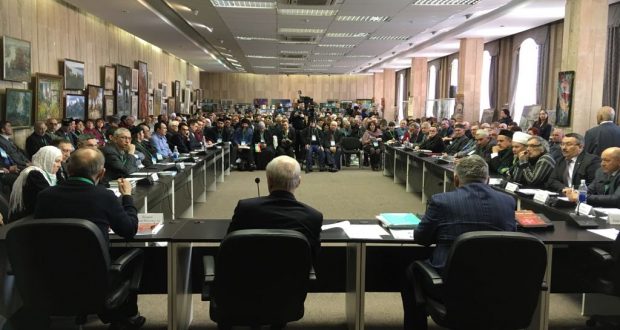Today within the framework of the II All-Russian Forum of Tatar regional specialists a round table was held:
04.04. 2018
Today within the framework of the II All-Russian Forum of Tatar regional specialists a round table was held: “The role of scientists, local lore and public figures in the study and preservation of the historical and cultural heritage, the history of the Tatar people”. More than 200 people took part in its work, about 200 reports were made.
The moderator of the round table was e chairman of the regional public organization “Society of Local History of the Republic of Tatarstan” Albert Burkhanov.
The following issues were raised during the event:
– Study of historical and cultural heritage and natural objects
– Experience with archival and museum materials
– Experience in writing village history and collecting materials
– Study of the history and culture of the disappeared villages
– Studying the history of the native land in school
The opening speech was given to head of the World Congress of Tatars Rinat Zakirov.
– Since the 90s, when a new history of our people began, a lot has been done. Our people have stood up firmly on their feet. In recent years, our local historians have made a big step in the study of the history of the Tatar villages, they have written quite a number of works, and they have reached the people. We must certainly think about what is necessary to preserve the history of our people. Fortunately, there are quite a lot of Tatar villages. And the history of many has been studied. However, there remains a layer of work. For example, the history of the appearance of Tatar villages in Iran has not been studied, and it is also necessary to study the history of the Tatars who settled in other foreign countries. We must educate a generation that knows its roots, “stressed Rinat Zakirov.
Then the floor was taken by the historian Damir Iskhakov, the editor-in-chief of the magazine «Native Land». He dwelled on the use of new types of sources in the study of the history of his native land. First of all, he noted that dastans can become an invaluable material for local historians. Although there are not so many dastans of the Tatar people, they can help the local lore specialists to clarify certain aspects of the history of this or that area. He also named individual dastans, which can be used to study the history of his native land.
Candidate of physical and mathematical sciences Farid Salimov spoke about the project “Atlas of Tatar villages”
– The task of creating a single information base of Tatar villages and villages today, especially in the conditions of global globalization, in the conditions of their unprecedented rapid disappearance from the map of settlements, acquires a special urgency and actuality. One of the central and effective mechanisms for resolving this issue, capability to integrate existing resources, to streamline and systematize existing and accumulated heterogeneous information, as well as to combine the efforts of scientific institutions, public organizations, and activists of settlements, is the Electronic Atlas of Tatar villages.
According to him, in 2012, the Institute of Applied Semiotics of the Academy of Sciences of the Republic of Tatarstan, in cooperation with the Institute of Oriental Studies of the Academy of Sciences of the Republic of Tajikistan, with the support of the RGNF Scientific Foundation, created an electronic atlas of Tatar folk dialects. And this approach can be used in the implementation of a project related to the history of Tatar settlements, he said.
We remind that from April 3 to 5, 2018 in Kazan the II All-Russia Forum of Tatar local lore wil be held. The forum will involve 374 delegates from 35 regions of the Russian Federation, 43 regions of the Republic of Tatarstan, Kazan and Naberezhnye Chelny.

